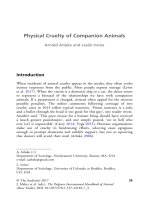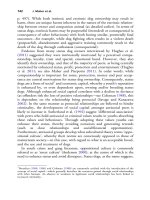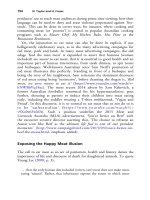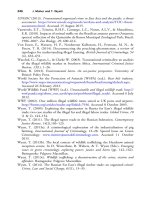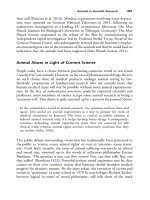The palgrave international handbook of a 113
Bạn đang xem bản rút gọn của tài liệu. Xem và tải ngay bản đầy đủ của tài liệu tại đây (35.73 KB, 1 trang )
Animal Neglect
103
safari parks and zoos). Frasch (2000) explains that the principle behind
much animal protection and welfare legislation is concern for the human
actor and the wider community because denying animals rights and the
subsequent cruelty and abuse that is permitted due to the absence of rights
might lead to violence towards humans. UK law addresses many of these
concerns by recognising animals as sentient beings capable of individual
characteristics; explicitly making actions that inhibits these individualistic
characteristics, whether direct or indirect, deliberate or unintentional, subject to criminal sanctions. Linzey (2009) has argued that the inability of
non-human animals to give or withhold their consent, their inability to
verbalise or represent their interests, their inability to comprehend, their
moral innocence, and not least of all, their relative defencelessness and
vulnerability—the core differences so often regarded as a basis for discriminating against them—are the very grounds for discriminating in favour
of them (Nurse and Ryland 2013). The Animal Welfare Act 2006 addresses
this principle by requiring those on whom companion animals are dependent for food, shelter and the opportunity to display their own normal
behaviours to ensure that the conditions in which their companions live are
sufficient for these needs to be met.
Arguably a new socially constructed notion of animal protection and
respect for non-human animals’ individualistic nature currently exists within
UK law which now recognises animals living alongside humans as individual
sentient beings. The law provides for their protection, respect and the
punishment of those who infringe on their right to exhibit certain behaviours
and live a particular lifestyle, even where done so via accidental neglect.
Contemporary law recognises animals as sentient beings requiring not just
protection from cruelty and mistreatment but also protection from psychological distress linked to suppression of an animal’s individual characteristics.
Thus, both deliberate and accidental mistreatment of non-human companions and abuse by means of neglect is punishable within the notion of a
duty of care and a duty to provide welfare. While animals’ status as human
property remains problematic in addressing issues of animal rights, widening
the principles of individualistic animal needs, inherent in contemporary UK
law, provides a means through which the notion of animals as just things that
can be neglected and ignored can be directly challenged.
